英语语法中的主谓一致
- 格式:doc
- 大小:62.00 KB
- 文档页数:12
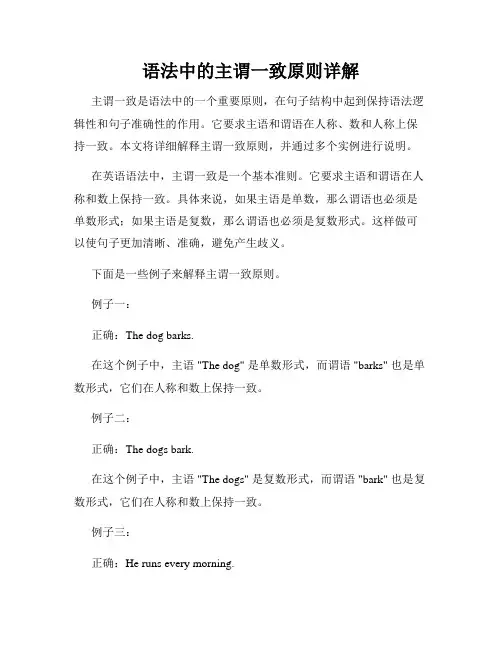
语法中的主谓一致原则详解主谓一致是语法中的一个重要原则,在句子结构中起到保持语法逻辑性和句子准确性的作用。
它要求主语和谓语在人称、数和人称上保持一致。
本文将详细解释主谓一致原则,并通过多个实例进行说明。
在英语语法中,主谓一致是一个基本准则。
它要求主语和谓语在人称和数上保持一致。
具体来说,如果主语是单数,那么谓语也必须是单数形式;如果主语是复数,那么谓语也必须是复数形式。
这样做可以使句子更加清晰、准确,避免产生歧义。
下面是一些例子来解释主谓一致原则。
例子一:正确:The dog barks.在这个例子中,主语 "The dog" 是单数形式,而谓语 "barks" 也是单数形式,它们在人称和数上保持一致。
例子二:正确:The dogs bark.在这个例子中,主语 "The dogs" 是复数形式,而谓语 "bark" 也是复数形式,它们在人称和数上保持一致。
例子三:正确:He runs every morning.在这个例子中,主语 "He" 是单数形式,而谓语 "runs" 也是单数形式,它们在人称和数上保持一致。
例子四:正确:They run every morning.在这个例子中,主语 "They" 是复数形式,而谓语 "run" 也是复数形式,它们在人称和数上保持一致。
通过这些例子,我们可以看到主谓一致的原则运用在不同类型的句子中。
无论是肯定句、疑问句还是否定句,主谓一致原则都需要被遵守。
除了人称和数,还有其他因素也会影响主谓一致的运用,比如连接词和修饰词。
例子五:正确:Either the cat or the dog is responsible for the mess.在这个例子中,主语 "Either the cat or the dog" 是单数形式,而谓语"is" 也是单数形式,两者在人称和数上保持一致。
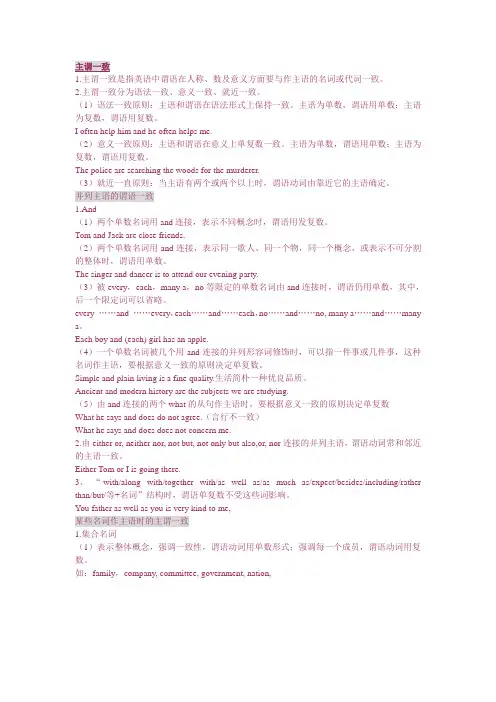
1.主谓一致是指英语中谓语在人称、数及意义方面要与作主语的名词或代词一致。
2.主谓一致分为语法一致、意义一致、就近一致。
(1)语法一致原则:主语和谓语在语法形式上保持一致。
主语为单数,谓语用单数;主语为复数,谓语用复数。
I often help him and he often helps me.(2)意义一致原则:主语和谓语在意义上单复数一致。
主语为单数,谓语用单数;主语为复数,谓语用复数。
The police are searching the woods for the murderer.(3)就近一直原则:当主语有两个或两个以上时,谓语动词由靠近它的主语确定。
并列主语的谓语一致1.And(1)两个单数名词用and连接,表示不同概念时,谓语用发复数。
Tom and Jack are close friends.(2)两个单数名词用and连接,表示同一歌人、同一个物,同一个概念,或表示不可分割的整体时,谓语用单数。
The singer and dancer is to attend our evening party.(3)被every,each,many a,no等限定的单数名词由and连接时,谓语仍用单数,其中,后一个限定词可以省略。
every ……and ……every,each……and……each,no……and……no, many a……and……many a。
Each boy and (each) girl has an apple.(4)一个单数名词被几个用and连接的并列形容词修饰时,可以指一件事或几件事,这种名词作主语,要根据意义一致的原则决定单复数。
Simple and plain living is a fine quality.生活简朴一种优良品质。
Ancient and modern history are the subjects we are studying.(5)由and连接的两个what的从句作主语时,要根据意义一致的原则决定单复数What he says and does do not agree.(言行不一致)What he says and does does not concern me.2.由either or, neither nor, not but, not only but also,or, nor连接的并列主语,谓语动词常和邻近的主语一致。

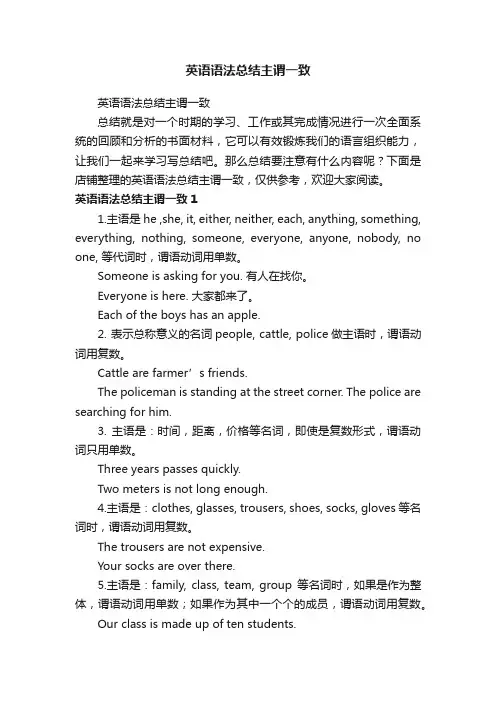
英语语法总结主谓一致英语语法总结主谓一致总结就是对一个时期的学习、工作或其完成情况进行一次全面系统的回顾和分析的书面材料,它可以有效锻炼我们的语言组织能力,让我们一起来学习写总结吧。
那么总结要注意有什么内容呢?下面是店铺整理的英语语法总结主谓一致,仅供参考,欢迎大家阅读。
英语语法总结主谓一致11.主语是he ,she, it, either, neither, each, anything, something, everything, nothing, someone, everyone, anyone, nobody, no one, 等代词时,谓语动词用单数。
Someone is asking for you. 有人在找你。
Everyone is here. 大家都来了。
Each of the boys has an apple.2. 表示总称意义的名词people, cattle, police做主语时,谓语动词用复数。
Cattle are farmer’s friends.The policeman is standing at the street corner. The police are searching for him.3. 主语是:时间,距离,价格等名词,即使是复数形式,谓语动词只用单数。
Three years passes quickly.Two meters is not long enough.4.主语是:clothes, glasses, trousers, shoes, socks, gloves 等名词时,谓语动词用复数。
The trousers are not expensive.Your socks are over there.5.主语是:family, class, team, group等名词时,如果是作为整体,谓语动词用单数;如果作为其中一个个的成员,谓语动词用复数。
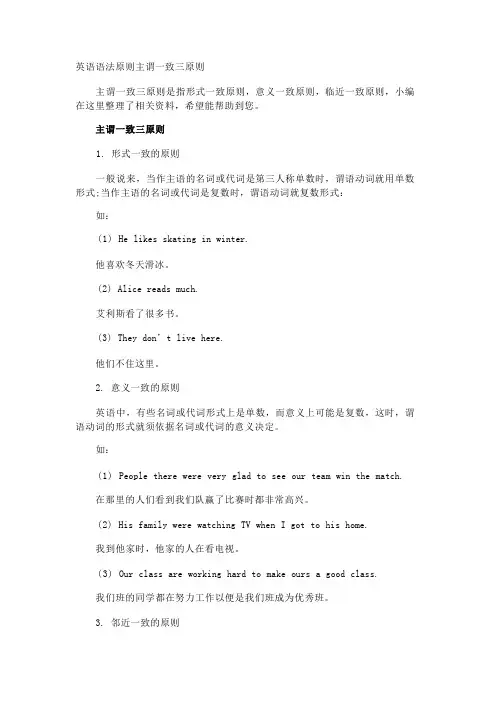
英语语法原则主谓一致三原则主谓一致三原则是指形式一致原则,意义一致原则,临近一致原则,小编在这里整理了相关资料,希望能帮助到您。
1. 形式一致的原则一般说来,当作主语的名词或代词是第三人称单数时,谓语动词就用单数形式;当作主语的名词或代词是复数时,谓语动词就复数形式:如:(1) He likes skating in winter.他喜欢冬天滑冰。
(2) Alice reads much.艾利斯看了很多书。
(3) They don’t live here.他们不住这里。
2. 意义一致的原则英语中,有些名词或代词形式上是单数,而意义上可能是复数,这时,谓语动词的形式就须依据名词或代词的意义决定。
如:(1) People there were very glad to see our team win the match.在那里的人们看到我们队赢了比赛时都非常高兴。
(2) His family were watching TV when I got to his home.我到他家时,他家的人在看电视。
(3) Our class are working hard to make ours a good class.我们班的同学都在努力工作以便是我们班成为优秀班。
3. 邻近一致的原则英语中,有时几个名词或代词有某些此连接起来一起作句子的主语,此时,谓语动词的形式就须有与之最接近的名词或代词的人称和数决定。
如:(1) There is a desk and five chairs in his room.他房间里有一张办公桌和五把椅子。
(2) There are five chairs and a desk in his room.他房间里有五把椅子和一张办公桌。
(3) Either you or Li Lei is going to be sent there.要么是你要么是李蕾将被派到那里去。
(4) Are either you or Li Lei going to be sent there.是你将被派到那里去还是李蕾将被派到那里去?基本句型一:S V (主+谓)主语:可以作主语的成分有名词(如 boy),主格代词(如you),动词不定式,动名词等。
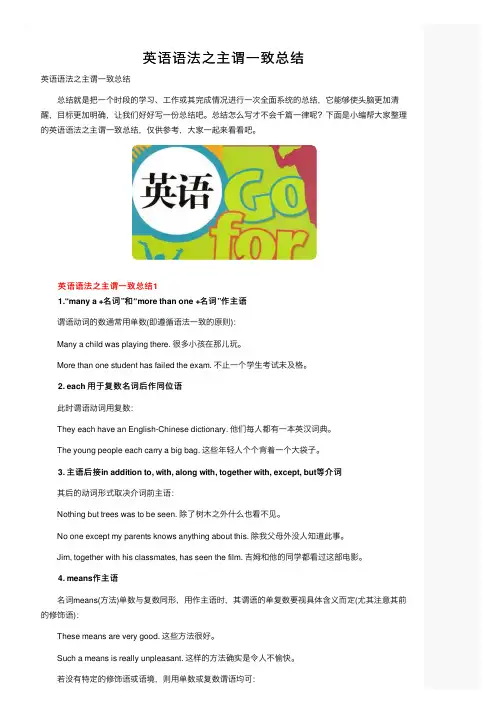
英语语法之主谓⼀致总结英语语法之主谓⼀致总结 总结就是把⼀个时段的学习、⼯作或其完成情况进⾏⼀次全⾯系统的总结,它能够使头脑更加清醒,⽬标更加明确,让我们好好写⼀份总结吧。
总结怎么写才不会千篇⼀律呢?下⾯是⼩编帮⼤家整理的英语语法之主谓⼀致总结,仅供参考,⼤家⼀起来看看吧。
英语语法之主谓⼀致总结1 1.“many a +名词”和“more than one +名词”作主语 谓语动词的数通常⽤单数(即遵循语法⼀致的原则): Many a child was playing there. 很多⼩孩在那⼉玩。
More than one student has failed the exam. 不⽌⼀个学⽣考试未及格。
2. each ⽤于复数名词后作同位语 此时谓语动词⽤复数: They each have an English-Chinese dictionary. 他们每⼈都有⼀本英汉词典。
The young people each carry a big bag. 这些年轻⼈个个背着⼀个⼤袋⼦。
3. 主语后接in addition to, with, along with, together with, except, but等介词 其后的动词形式取决介词前主语: Nothing but trees was to be seen. 除了树⽊之外什么也看不见。
No one except my parents knows anything about this. 除我⽗母外没⼈知道此事。
Jim, together with his classmates, has seen the film. 吉姆和他的同学都看过这部电影。
4. means作主语 名词means(⽅法)单数与复数同形,⽤作主语时,其谓语的单复数要视具体含义⽽定(尤其注意其前的修饰语): These means are very good. 这些⽅法很好。
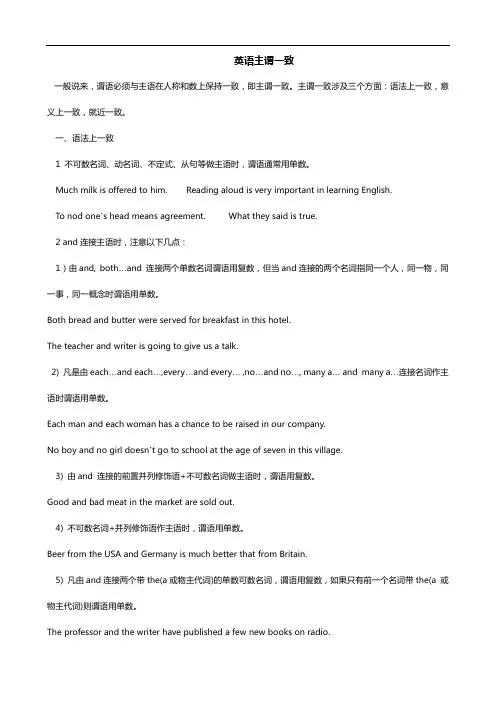
英语主谓一致一般说来,谓语必须与主语在人称和数上保持一致,即主谓一致。
主谓一致涉及三个方面:语法上一致,意义上一致,就近一致。
一、语法上一致1 不可数名词、动名词、不定式、从句等做主语时,谓语通常用单数。
Much milk is offered to him. Reading aloud is very important in learning English.To nod one’s head means agreement. What they said is true.2 and连接主语时,注意以下几点:1)由and, both…and 连接两个单数名词谓语用复数,但当and连接的两个名词指同一个人,同一物,同一事,同一概念时谓语用单数。
Both bread and butter were served for breakfast in this hotel.The teacher and writer is going to give us a talk.2) 凡是由each…and each…,every…and every… ,no…and no…, many a… and many a…连接名词作主语时谓语用单数。
Each man and each woman has a chance to be raised in our company.No boy and no girl doesn’t go to school at the age of seven in this village.3) 由and 连接的前置并列修饰语+不可数名词做主语时,谓语用复数。
Good and bad meat in the market are sold out.4) 不可数名词+并列修饰语作主语时,谓语用单数。
Beer from the USA and Germany is much better that from Britain.5) 凡由and连接两个带the(a或物主代词)的单数可数名词,谓语用复数,如果只有前一个名词带the(a 或物主代词)则谓语用单数。
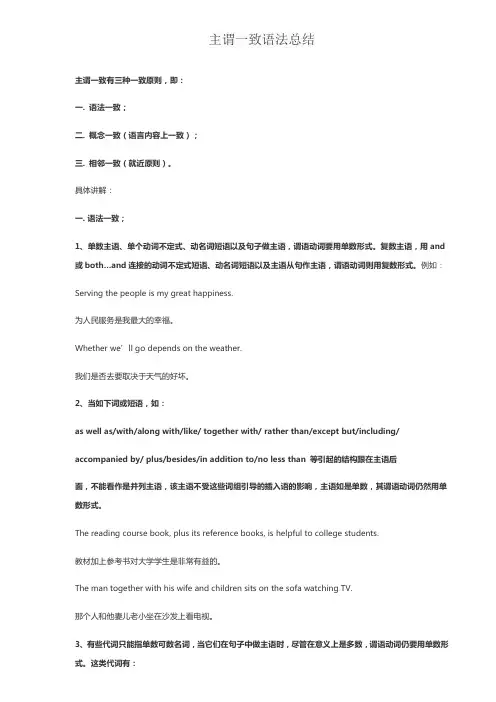
主谓一致语法总结主谓一致有三种一致原则,即:一. 语法一致;二. 概念一致(语言内容上一致);三. 相邻一致(就近原则)。
具体讲解:一. 语法一致;1、单数主语、单个动词不定式、动名词短语以及句子做主语,谓语动词要用单数形式。
复数主语,用and 或both…and连接的动词不定式短语、动名词短语以及主语从句作主语,谓语动词则用复数形式。
例如:Serving the people is my great happiness.为人民服务是我最大的幸福。
Whether we’ll go depends on the weather.我们是否去要取决于天气的好坏。
2、当如下词或短语,如:as well as/with/along with/like/ together with/ rather than/except but/including/ accompanied by/ plus/besides/in addition to/no less than 等引起的结构跟在主语后面,不能看作是并列主语,该主语不受这些词组引导的插入语的影响,主语如是单数,其谓语动词仍然用单数形式。
The reading course book, plus its reference books, is helpful to college students.教材加上参考书对大学学生是非常有益的。
The man together with his wife and children sits on the sofa watching TV.那个人和他妻儿老小坐在沙发上看电视。
3、有些代词只能指单数可数名词,当它们在句子中做主语时,尽管在意义上是多数,谓语动词仍要用单数形式。
这类代词有:either,neither,each one, the other ,another,somebody ,someone,something,anyone,anything,anybody,everyone,everything,everybody,no one,nothing ,nobody;例如:Neither likes the friends of the other.两人都不喜欢对方的朋友。
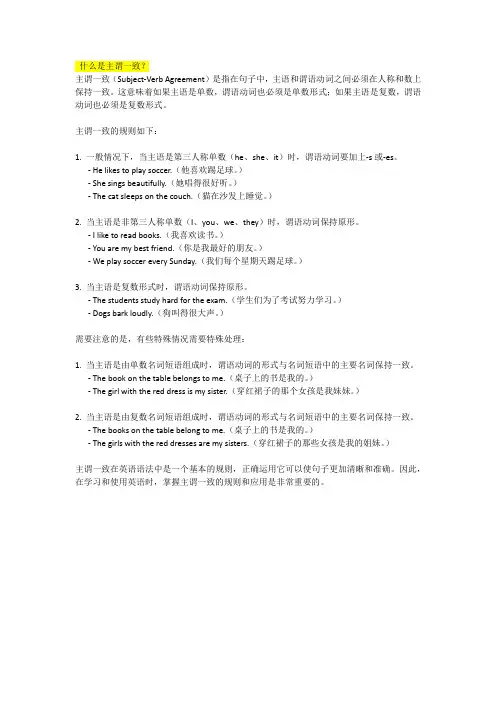
什么是主谓一致?主谓一致(Subject-Verb Agreement)是指在句子中,主语和谓语动词之间必须在人称和数上保持一致。
这意味着如果主语是单数,谓语动词也必须是单数形式;如果主语是复数,谓语动词也必须是复数形式。
主谓一致的规则如下:1. 一般情况下,当主语是第三人称单数(he、she、it)时,谓语动词要加上-s或-es。
- He likes to play soccer.(他喜欢踢足球。
)- She sings beautifully.(她唱得很好听。
)- The cat sleeps on the couch.(猫在沙发上睡觉。
)2. 当主语是非第三人称单数(I、you、we、they)时,谓语动词保持原形。
- I like to read books.(我喜欢读书。
)- You are my best friend.(你是我最好的朋友。
)- We play soccer every Sunday.(我们每个星期天踢足球。
)3. 当主语是复数形式时,谓语动词保持原形。
- The students study hard for the exam.(学生们为了考试努力学习。
)- Dogs bark loudly.(狗叫得很大声。
)需要注意的是,有些特殊情况需要特殊处理:1. 当主语是由单数名词短语组成时,谓语动词的形式与名词短语中的主要名词保持一致。
- The book on the table belongs to me.(桌子上的书是我的。
)- The girl with the red dress is my sister.(穿红裙子的那个女孩是我妹妹。
)2. 当主语是由复数名词短语组成时,谓语动词的形式与名词短语中的主要名词保持一致。
- The books on the table belong to me.(桌子上的书是我的。
)- The girls with the red dresses are my sisters.(穿红裙子的那些女孩是我的姐妹。
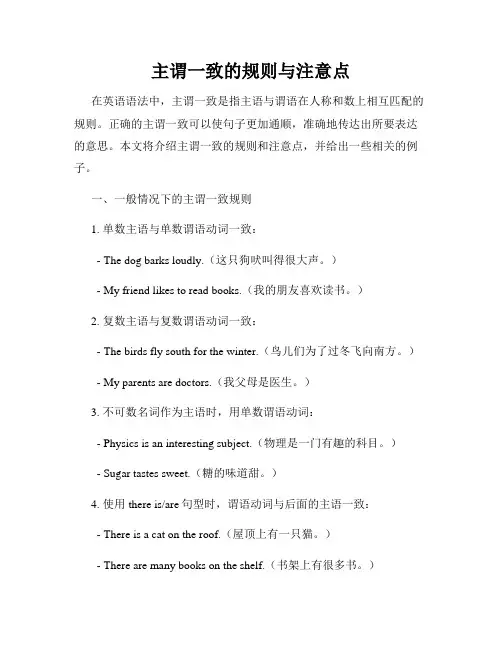
主谓一致的规则与注意点在英语语法中,主谓一致是指主语与谓语在人称和数上相互匹配的规则。
正确的主谓一致可以使句子更加通顺,准确地传达出所要表达的意思。
本文将介绍主谓一致的规则和注意点,并给出一些相关的例子。
一、一般情况下的主谓一致规则1. 单数主语与单数谓语动词一致:- The dog barks loudly.(这只狗吠叫得很大声。
)- My friend likes to read books.(我的朋友喜欢读书。
)2. 复数主语与复数谓语动词一致:- The birds fly south for the winter.(鸟儿们为了过冬飞向南方。
) - My parents are doctors.(我父母是医生。
)3. 不可数名词作为主语时,用单数谓语动词:- Physics is an interesting subject.(物理是一门有趣的科目。
)- Sugar tastes sweet.(糖的味道甜。
)4. 使用there is/are句型时,谓语动词与后面的主语一致:- There is a cat on the roof.(屋顶上有一只猫。
)- There are many books on the shelf.(书架上有很多书。
)二、特殊情况下的主谓一致规则1. 当主语由“each”, “every”, “either”, “neither”等修饰时,谓语动词用单数形式:- Each student needs to bring their own pen.(每个学生都需要带上自己的钢笔。
)- Neither of them is available tomorrow.(他们中的任何一个明天都不可用。
)2. 当主语由“either...or”, “neither...nor”, “not only...but also”等连接时,谓语动词与最靠近的主语一致:- Either the cat or the dogs are sleeping.(要么猫要么狗正在睡觉。

主语和谓语保持一致叫主谓一致,即谓语动词的形式必须随着主语单、复数形式的变化而变化;主谓一致原则:1、语法上的一致所谓语法一致原则,即主语和谓语的语法形式在人称和数上取得一致;谓语的单、复数形式依据主语的单、复数形式而定:主语为复数,谓语动词用复数;主语为单数或者是不可数名词,谓语动词用单数;China belongs to the Third World. 中国属于第三世界;We are sure he will come. 我们肯定他会来;使用语法一致的情况1当主语是and,both…and连接的并列结构如果主语指的是两个或两个以上的人或物,则谓语动词用复数;My mother and I have seen the film. 我妈妈和我已看过这部电影;Both rice and wheat are grown in this part of China. 在中国的这个地方既种稻子又种小麦;注意:由and连接的并列主语前面分别有each,every,no修饰时,其谓语动词用单数形式;Every boy and every girl has to receive education in our country. 在我国每一个男女孩子都得受教育;No student and no teacher was invited to the party. 师生没有被邀请参加晚会;2主语后面接说明主语的修饰语主语后面接说明主语的修饰语如:with,along with,together with,as well as,like,ratherthan,but,except,besides,including,in addition to,谓语动词不受修饰成分的影响,仍保持同主语一致的关系;The teacher with two students was at the meeting. 那位老师和两个学生参加了会议;The girl as well as the boys has learned to drive a car. 这个姑娘和男孩子一道,也学会了开汽车;A library with five thousand books is offered to the nation as a gift.一个有5000册书的图书馆作为礼物赠送给了国家;E-mail, as well as telephones, is playing an important part in daily communication.电邮和电话在日常的通信中起着很重要的作用;Nobody but Jane knows the secret.只有简知道这个秘密;All but one were here just now. 刚才除了一个人外都来了;3非谓语动词或从句作主语非谓语动词动词的-ing形式、不定式或从句作主语时,谓语一般用单数形式;When and where to build the new factory is not decided yet.什么时候在什么地方建新工厂还没定下来;Checking information is very important. 核实事实是非常重要的;To learn foreign languages is not easy. 学习外语并非易事;When we will hold the meeting is not decided yet. 我们何时开会尚未决定;注意:当what引导主语从句或由 and连接两个动词不定式或动名词作主语时,谓语动词的数应根据意义一致的原则来决定;What we need here is money.我们这里需要的是资金;What we need here are workers.我们这里需要的是工人;Lying and stealing are immoral.说谎与偷窃是不道德的;4each和复合不定代词作主语each和some/any/no一个比一个差;Nobody knows the answer. 没有一个人知道这答案;Someone wants to see you. 有人想见你;Is there anything in the box箱子里有什么东西吗There is a lot of milk in the bottle. 瓶子里有很多奶;5“many a +单数名词”作主语“many a、很多/more than one不只一个+单数名词”作主语时,谓语动词用单数形式;Many a student has been to Beijing. 很多学生去过北京;There is more than one answer to your question. 你的问题不只有一个答案;6“one of+复数名词十定语从句”之前有the等限定词和修饰语“one of+复数名词十定语从句”之前有the only,the very,the等限定词和修饰语时,定语从句的谓语动词用单数形式;Tom is the only one of those boys who is willing to help the old man.汤姆是唯一的一个愿意帮助那个老人的男孩;He is the only one of the students who has been a winner of scholarship for three years.他是这三年来唯一的一个获得奖学金的学生;注意:如没有这些限定词和修饰语,定语从句的谓语动词采用复数形式;Tom is one of the boys who are always ready to help others. 汤姆是个随时愿意帮助别人的男孩;7由两个部分组成的物体名词作主语英语中有些由两个部分组成的物体名称如g1asses眼镜,scissors剪刀,shorts 短裤,shoes鞋子,trousers裤子等作主语,其后的谓语动词用复数形式;His glasses were broken, so he can't see well. 他的眼镜碎了,因而看不清楚;His trousers are made of cotton. 他的裤子是棉布的;注意:若这类名词前带有pair等表示单位的名词时,则以这些名词的单、复数形式决定动词的形式;Two pairs of trousers are missing. 两条裤子不见了;This pair of shoes is not on sale. 这双鞋不出售;2、意义上的一致意义上的一致是指谓语动词与主语的一致取决于主语所表达的意义;若主语形式上为复数,而意义上是单数,动词要用单数;若主语形式上为单数,而意义上为复数,则动词用复数;The United States is in North America. 美国在北美洲;The police are looking into the matter. 警察正在调查此事;使意义上的一致的情况1由and连接两个并列主语其后的谓语动词一般用复数形式;但如果两个单数名词指同一个人、同一事物、单一概念时,谓语动词要用单数,有时两个名词共用一个冠词;The worker and writer has written a new novel. 这位工人兼作家写了一部新小说;两个名词共用一个冠词There is a journalist and writer living in America whose name is Alex Haley. 在美国有一个名叫亚利克斯哈利的记者兼作家;Truth and honesty is always the best policy. 真诚总是上策;注意:用and连接起来的两个单数主语,谓语动词可以是单数,也可以是复数;Three and five makes /make eight.三加五等于八;Time and tide wait/waits for no man .岁月不等人;2形复意单的名词作主语①复数形式的专有名词表示国家、城市、机构、组织以及书籍、报纸、杂志等做主语,通常作为整体看待,谓语动词用单数;The United States is in North America.美国在北美洲;The Arabian Nights is read all over the world.天方夜谭是流传世界各地的名着;The New York Times has a wide circulation.纽约时报销路很广;注意:表示山脉、群岛、瀑布等的专有名词和以复数形式出现的表示同姓的一家人或同名、同姓的若干人,谓语也用复数;The Alps rise over 4 countries.阿尔卑斯山脉跨越了四国;Niagara Falls are not as high as Victoria Falls.尼亚加拉瀑布没有维多利亚瀑布高;The Smiths were also invited.史密斯一家人也受到了邀请;There are 3 Marys and 2 Roberts in my class.我班有三个叫玛丽、两个叫罗伯特的学生;②以-ics结尾表示学科的名词做主语,通常表示单数意义,谓语动词用单数形式;这类名词有:physics, politics, mathematics, economics, athletics, electronics等;Politics is now taught in all schools.现在各学校都开设政治课;Economics is a science of the way in which industry and trade produce and use wealth.经济学是研究工业、贸易生财和用财之道;注意:当这些动词表示有关方面的活动、情况、见解、原理等意思时,谓语动词需用复数形式;What are his politics他的政见如何The economics of national growth are of the greatest importance to all modern governments.国家发展经济的原理对现代各国政府都重要;③news,maths,plastics,physics,works,means方法,the United States等虽然以-s结尾,但意义上作为单数看待;“News of victories keeps pouring in as our army advances,” the company commander said. 集团军司令说:”随着我们军队的推进胜利的消息接踵而至;”Mathematics/Physics is a required subject for us.数学/物理是我们必修的科目;Every possible means has been used to prevent the air pollution,but the sky is still not clear.所有可能的直至污染的方法都用了,但天空还是不晴朗的;④成对的名词做主语时用单数形式;Bread and butter is a daily food in the West .面包抹黄油是西方人每天的食品;His gratitude and devotion to the Party is endless.他无限感觉,无限忠于党;⑤“one and a half +复数名词”做主语,谓语动词用单数;One and a half pears is left on the table .一只半梨剩在桌子上;One and a half days is all I can spare.一天半是我所能挤出的全部时间;注意:“one or two+复数名词”做主语,谓语动词用复数;One or two days are enough to see the city.参观该市一两天就足够了;There are one or two things I want to talk over with you .我有一两件事想跟你商量;3有生命的集体名词作主语有生命的集体名词如people,police,cattle,militia作主语,谓语动词用复数形式;Cattle are also kept. 还养了一些牛;There are many people there. 那里有很多人;The police are looking for the thief. 公安人员在搜寻那个小偷;All the people of the world want peace.全世界人民都渴望和平;注意:family,team,class,government,audience,crew,committee等集体名词,如果作整体看待,谓语动词用单数形式;如果作个别成员看待,谓语动词用复数形式;people作“民族”解时,作单数用;Zhang’s family is rather big, with twelve people in all.张家很大,一共12口人;The family are sitting at the breakfast table. 这家人正坐在早餐桌旁;My family is a large one. 我家是个大家庭;The class are doing experiment in the lab. 全班同学正在实验室里做实验;The class has won the honour. 这个班获得了荣誉;The Chinese people is a great people.中华民族是一个伟大的民族;4 名词化的形容词作主语名词化的形容词作主语,按照意义一致的原则决定谓语动词的单、复数形式;如果指一类人,谓语动词用复数形式,如果指一个人或抽象概念,谓语动词用单数形式;这类形容词有:old, young, rich, poor, blind, deaf, dead, sick等;The rich are not always happy. 富人也有不开心的时候;The wounded is a policeman. 受伤者是一名警察;The beautiful is not always the same as the good. 漂亮的不一定就等于好;5 表示时间、距离、金钱、重量等的复数名词作主语表示时间、距离、金钱、重量、度量、容量、温度等的复数名词做主语,通常看作一个整体,谓语动词用单数形式;Twenty years has passed since we left school. 我们离开学校已经20年了;Ten thousand dollars is a lot of money. 一万美元是一大笔钱;Two months is quite a long time. 两个月时间是很长的;Two hours is enough for us to do this experiment.我们做这个实验两个小时就够了;Thirty kilometres is a good 公里是一个相当远的距离;注意:如果说话人侧重一个个的个体,谓语动词用复数形式;Twenty years have passed since we parted.自从我们分手以后20年己经过去了;6“a number of十复数可数名词”与“the number of十复数可数名词”作主语“a number of十复数可数名词”表示“一些、许多”的意思,谓语动词用复数;“the number of十复数可数名词”表示“……的数目、数量”,谓语动词用单数;The number of people invited was fifty, but a number of them were absent for different reasons.邀请来的人数是50,但很多人因不同的原因没来;A number of books are missing from the library.图书馆丢了许多书;The number of workers in this factory is increasing.这家工厂的工人数目正在增加;7none of和neither of后跟复数名词或复数代词作主语none of和neither of后跟复数名词或复数代词时,有时作单数看待,有时作复数看待,主要根据说话人的意思决定;None of them has arrived yet at the settlement. 他们没有一个到达新住宅区;None of them have arrived yet. 他们都还没到;8“分数/百分数+of短语”作主语“分数/百分数+of短语”作主语,这时要以of短语中的名词是否为复数而定;Two fifths of the land in that district is covered with trees and grass.该地区五分之二的土地为树木和草所覆盖;89% of smokers are male. 89%的吸烟者是男性;In the USA, 75% of the grain is used to feed animals. 在美国,75%的谷物用来喂养动物;Two-thirds of the earth's surface is sea. 地球表面的2/3是海洋;Two-thirds of the people were against the plan. 2/3的人都反对核计划;9表示部分概念或不定数量的名词或代词作主语表示部分概念或不定数量的名词或代词作主语,谓语动词用单数还是复数,应根据后接名词的单、复数形式而定;这些名间或代词有all,any,enough,half,more,most,the rest,part,some等;The rest of the buildings are easy to get to. 其余的建筑物并不难上;The rest of his life was happy. 他的晚年生活很幸福;Most of my time was spent in reading. 我大部分时间用来读书;Most of the people are aware of it. 大部分人都知道它;Some of the sugar was spilled on the floor. 一些糖散落在地上;Some of the apples were spilled on the floor. 一些苹果散落在地上;10两个主语,一个肯定,一个否定,谓语动词与肯定主语相一致;The parents, and not the son, were missing.失踪者不是儿子,而是他的双亲;3、邻近原则邻近原则是指谓语动词要与它最邻近的名词或代词保持人称与数的一致;Neither he nor I am a student. 他和我都不是学生;There is a pen , two chairs and a desk. 有一支钢笔,两把椅子和一张桌子;这主要有以下几种情况;1由or,either…or等连接的并列结构作主语由or、either…or、nor、neither…nor、not only…but also、not…but连接的并列主语,通常按照就近一致原则,谓语动词的单、复数形式依照靠近它的主语而定;Either you or the headmaster is to hand out the prizes to these gifted students at the meeting.要么你要么校长在会议上对这些天才的学生颁奖;Neither he nor I have finished the experiment. 他和我都没有做完试验;Either his friends or his brother is wrong. 不是他的朋友们错了,就是他哥哥错了;Not only I but also Jane and Mary are tired of having one examination after another.不仅我而且简和玛丽都讨厌一个接一个的考试;Not only the teacher but also his students have studied the question. 不仅老师而且他的学生们都研究了这个问题;2在主谓倒装句时在主谓倒装句中,主语并列,谓语动词的人称和数与最近的主语相一致;由here或there引导的句子,若有并列主语,谓语也与最靠近的那个主语一致;There is a desk, a table and three chairs in the room. 房间里有一张书桌、一张饭桌和3把椅子;There are three chairs, a desk and a computer in the room. 房间里有3把椅子、一张书桌和一台电脑;Where is your wife and children to stay while you are away你不在时妻子和孩子呆在哪儿"表里不一"现象:以-s结尾的名词作主语的主谓一致:英语可数名词的规则复数形式是在词尾加-s或-es,但是有一些以-s结尾的名词并不是可数名词;它们用法多样,造成了实际使用上的困难,以下详述了以-s结尾的名词作主语的主谓一致问题;一以-s结尾的疾病名称作主语的主谓一致问题二以-s结尾的游戏名称作主语的主谓一致问题三以-s结尾的地理名称作主语的主谓一致问题四以-ics结尾的学科名称作主语的主谓一致问题五其它以-s结尾的名词的主谓一致问题集合名词的主谓一致原则:集合名词作主语时,主谓一致关系是一个较为复杂的问题.对此类问题我们可以从"数"的角度分为四类.1单数—复数型.凡是有复数词尾变化形式的集合名词都属于此类;如:a class—classes; a family—families; a government—governments; an army —armies; a people—peoples; a group—groups; a crowd—crowds; a crew —crews等;这类集合名词强调的是整体性,即当作一个整体或多个整体来看待;属于这类集合名词的单数作主语时,谓语动词用单数;复数形式作主语时,谓语动词用复数;例如A big crowd often gathers on the square every morning.每个上午一大群人经常聚集在广场上The government has decided to pass the bill.政府已决定通过这一法案There are huge crowds in the streets on Sunday.星期天有大群大群的人在街上;There are many English-speaking peoples in the world.在世界上有许多讲英语的人但应注意,这类集合名词的单数形式有时表示复数概念,所以这些集合名词的单数形式也可归为"单复同形型"中.2单数型.这类集合名词表示的是人或事物的整体,即把这类人或事物的全部包括在内,所以只有单数形式.如作主语,谓语动词常用单数;这类名词常见的有:humanity,mankind,proletariat等.例如The proletariat is the greatest class in the history of mankind. In the fields of production and scientific experiment,mankind makes constant progress.3复数型.这类集合名词在形式和内容上是相互矛盾的,就是说它们只有单数形式,但表达的都是复数概念;它强调的是集体中的个体性.这类名词有:police,cattle,faculty,flock,machinery,vermin,personnel等.它们作主语时,谓语动词要用复数.例如The police have caught the murder.Our personnel are very highly trained.The vermin are very dangerous.4单复同形型.这类集合名词的单数形式既可表示单数也可表示复数.作主语时,用单数动词或复数动词均可,有时意义区别不大.例如The school teaching staff are is excellent.The public is are requested not to litter in the park.The teaching profession claims to be badly paid.这类集合名词常见的有:class,family,team,crew,board,herd,committee,party,jury,enemy,audience 等.根据说话人的心理意向若把这个集合名词所代表的人或事物看作一个整体,就认为是单数,用单数动词;若把它所代表的人或事物看作若干个个体的话,就认为其为复数,用复数动词;试比较:The football team is playing well.那个足球队打得非常漂亮.The football team are shavings bath and are then coming back here for tea. 足球队员们正在洗澡,然后来这里吃茶点;The family is a very happy one.那个家庭是一个非常幸福的家庭;That family are very pleased about the news of William's success. 全家人对威廉的成功都感到很高兴;巧记主谓一致原则:单单复复最常见,集体名词谓用单,如若强调其成员,复数谓语记心间;有些名词谓常复,people,police即这般;主语单数后接介,谓语单数介无关,many a作主语也如此,谓语动词应用单;or、nor、but also、there be,近主原则挂嘴边;关系代词定主语,谓语根据先行词判;不定式短语、动名词,主语从句谓全单;时间、货币与距离,谓语多单复少见,rest,means,fol1owing等,意义决定其复、单;none,all,half of等,of之宾语定答案;还有分数、百分数,仍据of之宾定复、单;代词all指人谓复数,all指事情谓用单;量词用法请注意,谓语要随量词变;and连接两名词,身兼两职一定冠,no,each,every后单名,两件种事物系一概念,以上情况请记清,谓语动词全用单;形容词带the一类人,姓氏复数加定冠,-s结尾的海峡、山脉与群岛,谓语用复勿用单;neither,either,each,用作主语谓全单;。
主谓一致主谓一致Subject-Verb Concord即谓语动词在人称和数上要和主语保持一致;主谓一致包括语法一致、意义一致和就近一致;语法一致即谓语动词在单复数形式上要和主语保持一致;意义一致就是谓语动词要和主语意义上的单复数保持一致;就近一致就是谓语动词要和靠近它的主语部分保持一致..表里不一主谓一致中的"表里不一"现象1;"more than one +名词"作主语时;谓语动词常用单数.例如:More than one teacher gets the flowers. 不止一个教师得到了花. 2;"many a +名词"作主语时;从意义上看是复数;但谓语动词常用单数.例如:Many a student has been sent to plant trees. 很多学生被派去植树.3;"half of ;the rest of ;most of ;all of及百分数或分数+of 等后接名词"作主语时;谓语动词形式根据of后的名词而定.例如:Three fourths of the surface of the earth is covered with water.地球表面四分之三为水所覆盖.4;all指人时;动词用复数;all指物时;动词用单数.例如:"All are present and all is going well." 所有人全部到场了;一切进展顺利5;what引导的主语从句;谓语动词可视表语而定:表语是单数名词时;动词用单数;相反;则用复数.例如:What they want to get are a number of good books.他们想得到的是大量的好书.6;and连接的两个单数名词前若用each ;every ;no修饰;该名词短语作主语时;谓语动词用单数形式.例如:No book and no pen is found in the schoolbag.书包里没有书和钢笔.7;当主语后面有as well as ;with ;along with ;together with ;but ;like ;rather than ;except;逗号加and连接几个名词等引导的短语时;谓语动词要与最前面的主语保持一致.例如:My father as well as his workmates has been to Beijing. 我父亲和他的同事曾去过北京.8;each作主语的同位语时;谓语动词由主语来决定;与each无关.例如:They each have a bike. 他们每人有一辆自行车.9;动词不定式;动词-ing形式短语作主语时;谓语动词常用单数.例如:Going out for a walk after supper is a good habit.晚饭后出去散步是一个好习惯.10;the following作主语时;谓语动词的数与后面名词的数保持一致.例如:The following are good examples下面是一些好例子.11;以-ics结尾的学科名词;如politics ;physics ;mathematics等作主语时;谓语动词用单数.以-s结尾的名词news ;works ;plastics等同属此类.例如:Politics is now taught in all schools. 现在各学校都开设政治课.当以-ics结尾的学科名词表示"学科"以外的意义时;用作复数;如:mathematics运算能力politics政治观点economics经济意义等..12;有些用来表示由两个对应部分组成一体的名词复数trousers ;glasses ;shoes .shorts .scissors .scales等作主语时;前面若有"一条";"一副";"一把"之类的单位词;动词用单数;若没有单位词或单位词是复数;则谓语动词用复数.例如:The shoes are all right. 这些鞋子都很合适.还有一些以-s结尾的名词通常用复数:arms武器.clothes .contents .minutes记录.remains遗体.thanks等13;"one and a half +名词"作主语时;谓语动词要用单数.例如:One and a half apples is left on the table. 桌子上有一个半苹果.14;"One or two more +复数名词"作主语时;谓语动词用复数.例如:One or two persons are sent there to help them do the work. 要派一两个人到那儿去给他们帮忙.15;"one of+复数名词+ 定语从句"结构中;定语从句的谓语动词要用复数;而在"the only one of +复数名词+定语从句"的结构中;"the one of + 复数名词+定语从句"定语从句的谓语动词要用单数.例如:He is one of the students who get there on time.他是准时到达那里的学生之一.16;表示时间;距离;金钱等的复数名词作主语表达一个整体概念时;谓语动词常用单数;但若强调数量;谓语动词可用复数.例如:One million dollars is a lot of money. 一百万美元是一大笔钱. -s结尾一以-s结尾的疾病名称作主语的主谓一致问题;以-s结尾的疾病名称作主语的主谓一致问题;如:arthritis ;bronchitis ;diabetes ;mumps ;phlebitis ;rickets;这类以-s结尾的疾病名称作主语时;谓语动词通常用作单数..例如:Arthritis causes great pain in the joints of the patient.二以-s结尾的游戏名称作主语的主谓一致问题;以-s结尾的游戏名称作主语时;谓语动词通常用作单数..例如:Darts is basically an easy game.但当Darts;Marbles等的意义为游戏器具而非游戏名称时;谓语动词通常用作复数..例如:Three darts are thrown at each turn.All nine skittles were brought down by the good throw.三以-s结尾的地理名称作主语的主谓一致问题;某些以-s结尾的地理名称;如果是国名;如the United States;the Netherlands等;因其是单一政治实体;所以谓语动词用作单数..例如:The United States was hit by the Great Depression in 1930s'.In early January 1996 the Netherlands was hit by its worst storm since 1976.但如果是群岛、山脉、海峡、瀑布等地理名称作主语;谓语动词用作复数..例如:The West Indies are commonly divided into two parts.四以-ics结尾的学科名称作主语的主谓一致问题;某些以-ics结尾的学科名称作主语时;如physics ;mathematics ;mechanics ;optics ;acoustics ;politics;st atistics ;economics ;linguistics ;athletics等;谓语动词通常用作单数..例如:The third world economics is promising.Athletics is a required course for students of all grades.但如果这类名词表示学科以外的其它含义;可作复数用..例如:Athletics have been greatly encouraged at this college.五其它以-s结尾的名词的主谓一致问题;.以-s结尾的由两部分组成的物体名称作主语;英语中有一些通常以-s结尾的由两部分组成的物体名词;如glasses ;pincers ;pliers ;scissors ;shorts ;suspenders ;trousers 等; 为复数名词;后接复数谓语集合名词1单数—复数型.凡是有复数词尾变化形式的集合名词都属于此类.如:a class—classes; a family—families; a government—governments; anarmy—armies ;a people—peoples民族; a group—groups; a crowd—crowds; a crew—crews等.这类集合名词强调的是整体性;即当作一个整体或多个整体来看待.属于这类集合名词的单数作主语时;谓语动词用单数;复数形式作主语时;谓语动词用复数.例如A big crowd often gathers on the square every morning.每个上午一大群人经常聚集在广场上The government has decided to pass the bill.政府已决定通过这一法案There are huge crowds in the streets on Sunday.星期天有大群大群的人在街上..There are many English-speaking peoples in the world.在世界上有许多讲英语的民族..但应注意;这类集合名词的单数形式有时表示复数概念;所以这些集合名词的单数形式也可归为"单复同形型"中.2单数型.这类集合名词表示的是人或事物的整体;即把这类人或事物的全部包括在内;所以只有单数形式.如作主语;谓语动词常用单数.这类名词常见的有:humanity ;mankind ;proletariat等.例如The proletariat is the greatest class in the history of mankind. In the fields of production and scientific experiment ;mankind makes constant progress.3复数型.这类集合名词在形式和内容上是相互矛盾的;就是说它们只有单数形式;但表达的都是复数概念.它强调的是集体中的个体性.这类名词有:police ;cattle ;faculty ;flock ;machinery ;vermin ;personnel等.它们作主语时;谓语动词要用复数.例如The police have caught the murder.Our personnel are very highly trained.The vermin are very dangerous.4单复同形型.这类集合名词的单数形式既可表示单数也可表示复数.作主语时;用单数动词或复数动词均可;有时意义区别不大;具体看语境;是强调集体还是个体..例如The school teaching staff are is excellent.The public is are requested not to litter in the park.The teaching profession claims to be badly paid.这类集合名词常见的有:class;family;team;crew;board;herd;committee;party;jury;enemy;au dience等.根据说话人的心理意向若把这个集合名词所代表的人或事物看作一个整体;就认为是单数;用单数动词;若把它所代表的人或事物看作若干个个体的话;就认为其为复数;用复数动词.试比较:The football team is playing well.那个足球队打得非常漂亮. The football team are shavings bath and are then coming back here for tea. 足球队员们正在洗澡;然后来这里吃茶点.The family is a very happy one.那个家庭是一个非常幸福的家庭.That family are very pleased about the news of William's success. 全家人对威廉的成功都感到很高兴.典型例题1 并列结构作主语时谓语用复数Reading and writing are very important.注意:当主语由and连接时;如果它表示一个单一的概念;即指同一人或同一物时;谓语动词用is;and 此时连接的两个词前只有一个冠词;共用一个冠词用单数;表示The iron and steel industry is very important to our life.The League secretary and monitor ___ asked to make a speech at the meeting.A. isB. wasC. areD. were答案 B. 注:先从时态上考虑.这是过去发生的事情应用过去时;先排除A.;C..本题易误选D;因为The League secretary and monitor 好象是两个人;但仔细辨别;monitor 前没有the;在英语中;当一人兼数职时只在第一个职务前加定冠词.后面的职务用and 相连.这样本题主语为一个人;所以应选B.2 主谓一致中的就近原则当there be 句型的主语是一系列事物时;谓语应与最邻近的主语保持一致.There is a pen;a knife and several books on the desk..There are twenty boy-students and twenty-three girl-students in the class.总的来说;在由not only…but also…;not just…but…;or;either…or…;neither…nor…连接主语的句子中及在there be句型中;谓语动词的单复数按就近原则处理;即按与谓语动词最靠近的那个主语来确定谓语动词的单复数形式..如:Not only John but also I am going to Shanghai next week.Either you or she is to go.There is a pen ;a few envelops and some paper for you.3 谓语动词与前面的主语一致当主语后面跟有with ;together with ;like; except ;but ;no less than ;as well as 等词引起的短语时;谓语动词与前面的主语一致.The teacher together with some students is visiting the factory. He as well as I wants to go boating.4 谓语需用单数1 代词each和由every ;some ;no ;any等构成的复合代词作主语;或主语中含有each ;every;谓语需用单数.Each of us has a tape-recorder.There is something wrong with my watch.2 当主语是一本书或一条格言时;谓语动词常用单数.The Arabian Night is a book known to lovers of English.<一千零一夜>是英语爱好者熟悉的一本好书.3 表示金钱;时间.距离.价格或度量衡的复合名词作主语时;通常把这些名词看作一个整体;谓语一般用单数.用复数也可;意思不变.Three weeks was allowed for making the necessary preparations. Ten yuan is enough.5 指代意义决定谓语的单复数1 在代词what ;which ;who ;none ;some ;any ;more ;most ;all等词的单复数由其指代的词的单复数决定.All is right. 一切顺利.All are present. 所有人都到齐了.2 集体名词作主语时;谓语的数要根据主语的意思来决定.如family ;team;group;club ;public ;audience ;crew ;crowd ;class ; company ;committee等词后用复数形式时;意为这个集体中的各个成员;用单数时表示该个集体.His family isn't very large. 他家不是一个大家庭.His family are music lovers. 他的家人都是音乐爱好者.但集合名词people ;police ;cattle ;poultry家禽.militia民兵.vermin 害虫等在任何情况下都用复数形式.Are there any police around3有些名词;如variety ;number ;population ;proportion ;majority 等有时看作单数;有时看作复数.A number of +名词复数+动词的第三人称单数形式.The number of +名词复数+动词非第三人称单数形式.A number of books have lent out.The majority of the students like English.6 与后接名词或代词保持一致1 用half of; part of ;most of ;a portion of 等词引起主语时;动词通常与of后面的名词;代词保持一致.Most of his money is spent on books.Most of the students are taking an active part in sports.2 在一些短语;如 many a 或 more than one 所修饰的词作主语时;谓语动词多用单数形式.但由more than… of 作主语时;动词应与其后的名词或代词保持一致.Many a person has read the novel. 许多人都读过这本书.More than 60 percent of the students are from the city.百分之六十多的学生都来自这个城市.7 the+形容词/国籍形容词..表示一类人/一国人;作主语;谓语动词用复数..8 the+姓氏的复数;表示一家人或两夫妇;作主语时;谓语动词用复数;9四则运算时;谓语动词用单数..10 表示;时间;距离;重量;金额;书名的复数名词作主语时;通常当做整体看待;谓语动词用单数..。
主谓一致第一部分主谓一致是指谓语在人称上必须和主语的人称和数保持一致。
这是英语语法中必须遵守的基本规则。
谓语一致主要有以下几种情况。
主谓一致:一·语法原则一致二·意义一致三·就近原则1语法一致主语为单数形式,谓语动词也用单数形式。
谓语动词为复数形式,谓语动词也用复数形式。
eg: I often help him and he often helps me . (不可数名词作主语,谓语动词用单数:可数名词的复数形式作主语。
谓语动词用复数。
)2 如果连接两个或两个以上的并列结构是指同一人或物,或指同一概念,谓语动词用单数,这是and后面的名词前不加冠词。
如:表示整体概念的并列结构。
Bread and butter knife and fork配套的事物A watch and chain a needle and threadThe knife and fork is on the desk 刀叉饭放在桌子上3 主语后面带有with,along with,together with ,as well as ,besides ,like ,without ,except ,including ,but ,rather than 等引导的短语时,谓语动词必须与前面的主语在人称和数上保持一致eg :The teacher ,together with his student ,is planting trees in the garden 老师和学生们正在花园里种树E-mail,as well as the telephones is playing an important part in daily communication.4 如果主语是是不定式,动词—ing形式或主语从句时,谓语动词用单数。
What he is doing seems very important 他正在做什么看起来很重要。
什么是英语中的主谓一致英语中的主谓一致指的是句子中的主语与谓语在人称和数上保持一致。
在英语语法中,主语的人称和数应与谓语的人称和数相匹配,以确保句子的结构正确和语义清晰。
主谓一致是英语语法中的基本规则之一,它对于正确表达意思和避免语法错误非常重要。
在英语句子中,主谓一致的主要规则如下:1. 一般情况下,在单数形式的主语前使用单数形式的谓语动词,而在复数形式的主语前使用复数形式的谓语动词。
例如:- He walks to school every day.(他每天步行上学。
)- They walk to school every day.(他们每天步行上学。
)2. 当主语是第三人称单数时,谓语动词要加上“-s”或“-es”。
例如:- She reads a book.(她在读一本书。
)- The cat sits on the mat.(猫坐在地毯上。
)3. 当主语是以“-s”、“-x”、“-z”、“-o”结尾的名词时,谓语动词不需要添加“-s”。
例如:- The bus stops here.(公共汽车在这里停车。
)- The box contains books.(盒子里装着书。
)4. 当主语是不可数名词时,谓语动词使用单数形式。
例如:- Water is essential for life.(水对于生命是必不可少的。
)- Music brings joy to people.(音乐给人们带来快乐。
)5. 当主语是复合主语,且由and连接时,谓语动词使用复数形式。
例如:- Tom and Jerry are good friends.(汤姆和杰瑞是好朋友。
)6. 当主语是复合主语,且由or、nor连接时,谓语动词与最接近的主语保持一致。
例如:- Either John or his brothers are responsible for the mess.(要么是约翰,要么是他的兄弟们对这个乱糟糟的地方负责。
英语语法中的主谓一致问题第二讲英语中的一致是指句子成分之间或词语之间在人称、数、性、时等方面保持一致的协调关系。
1。
人称一致:1)主语与谓语动词之间:除动词be有不同的人称形式以及have有特殊的单数第三人称现在时has外,其他动词只有单数第三人称现在时加-s/-es,其余的人称在动词形式上并无特殊的标记。
2)名词或代词与用以代替这个名词或代词的代词之间,如:The boy is here and he is a pupil.She did this herself.2。
数的一致:1)主语和谓语之间,如:The girl sings.The girls sing.2) 名词或代词与用以代替这个名词或代词的代词之间, 如:The boy has lost his own toy.We love our motherland.3)名词与它的限定词之间,如:one boy, this boy, these boys, many boys…4)主语与主语补足语之间,如:He is a bright pupil.They are Englishmen.5)宾语与宾语补足语之间,如:I consider my child an angel.I consider my children angels.3。
性的一致:这种形式的一致主要存在于名词或代词与第三人称的人称代词或物主代词之间,如:The boy is here. He is a student, but his father is an engineer.4。
时的一致:这主要是指主从复合句中主句谓语动词的时与作为宾语从句的间接引语中谓语动词的时的一致。
如:He says he understands us.He said he understood us.数的一致人称、格、性的一致比较简单,重点注意数的一致。
数的一致涉及到三个基本的指导原则:1)语法一致Grammatical concord,指谓语动词和主语在单复数形式上的一致。
The girl speaks English.2)意义一致Notional concord,即谓语动词的单数或复数要取决于主语所表达的概念,而不取决于表面的语法标记。
如:My family are well.3)邻近原则Principle of proximity,即指谓语动词的形式与邻近的名词一致。
关系从句中的谓语动词1.在“one of +名词(复数)+关系从句”中的单复数, 关系从句中的谓语动词常采用复数形式。
通常依照语法一致原则【例如】She is one of the students who have passed Band Six.This is one of the best books that have been published recently.【例如】She is the only one of the girls who is chosen as the member of student union.He was the only one of the boys who was given a prize.This is the one of the books on the subject that has ever been written in Chinese.2.[注]在“代词+定语从句”中,从句中的谓语人称,性,数要与被修饰的代词保持一致Each one of us who are for the proposal is supported to come here tomorrow.I, who am your friend, will try my best to help you.谓语动词常用单数的情况1)名词性从句及不定式、动名词作主语时,谓语动词一般用单数形式。
【例如】T o finish the work in advance is what he wants.Smoking cigarettes is dangerous to your healthWhat seems easy in theory is difficult in practice.What caused the accident is a complete mystery. 但是,what引导名词从句作主语时,其表语是复数形式时,系动词也可以是复数形式。
【例如】What we badly need here are qualified teachers.2)当主语是单数,后面跟着由as well as, no less than ,rather than, more than, but, except, including,besides,with, together with, along with, like, in addition to, instead of ,plus, combined with, accompanied by, as much as,等连接的短语时,谓语动词用单数。
【例如】Mary as well as her sister likes listening to music.Doctor Richards, together with his wife and three children, is to arrive on the afternoon flight.My best friend rather than anyone else has got the first prize in the speech contest.3) many a…或many a …and…作主语时,谓语动词用单数形式。
【例如】Many a student doesn't like to do their homework.(many a student=many students)More than one person was involved in the case.Many a singer and dancer is to attend our evening party.4)##### and所连接的两个单数名词作主语,指同一人、同一件事或同一概念时,其谓语动词用单数。
例如:My best friend and adviser has changed his mind again.Bread, butter and eggs is typical American Breakfast .If law and rule is not preserved, neither the citizen nor his property is safe.如果不能维持治安,公民和他的财产都不安全。
Bread and butter is a daily food in the west.常用的该类短语:a cart and horse马车a cup and saucer一套杯碟cause and effect因果a wheel and axle轮轴law and order法律与秩序the needle and thread针线5)####and所连接的两个单数名词作主语,指不同一人、不同一件事或不同一概念时,其谓语动词用复数。
例如:The teacher and his pupils are invited to the English corner.The bread and the butter are on sale.6)当and连接的名词前有each ,every修饰时,谓语动词用单数6).1当主语是each…and(each)…,every…and (every)…, no…and (no)…,结构时,谓语动词用单数。
In our country every boy and girl has right to receive education.No teacher and no student is present.6) .2[注]但并列主语后加each(在此处作同位语),谓语仍用复数,Mary and T om each have their own bedroom.玛和汤都有各自的寝室。
7)当不定代词all (of), most (of),some (of),any (of)以及“分数+of”等做主语时,谓语动词要根据代词所表达的意思而定,如果它们后跟名词复数谓语动词用复数形式,若跟不可数名词,谓语动词用单数形式A variety of students are busy doing their exercises in the reading room.Three-tenths of the earthwork is moved by machinery.Most of the information on the report is correct.Some of the rice ______ .[a] has been spoiled [b]were spoiled[c]have been spoiled [d ]are spoiled8)事件、公司机构、国名、书名、剧名、报刊名的复名词等专有名词作主语时,谓语动词用单数。
带有复数词尾的学科名称等在意义是表示单数概念,用单数动词。
【例如】The Adventures of Huckleberry Finn was written by Mark T wain and it is an interesting book. The United Nations is an organization to defend world peace.The Daily News says it is going to rain tomorrow.谓语动词用复数的情况1) both, some, few, many等用作主语或修饰主语时,谓语动词用复数。
2)“the +形容词”作主语,在表示一类人或事物时,谓语动词用复数。
【例如】 the young; the sick; the dumb; the deaf;the blind; the weak;The young are full of vigor.The aged are well taken care of by the government.The poor are often looked down upon by the rich.[注]但当定冠词“The+形容词或分词”表示抽象概念时,谓语动词用单数形式。